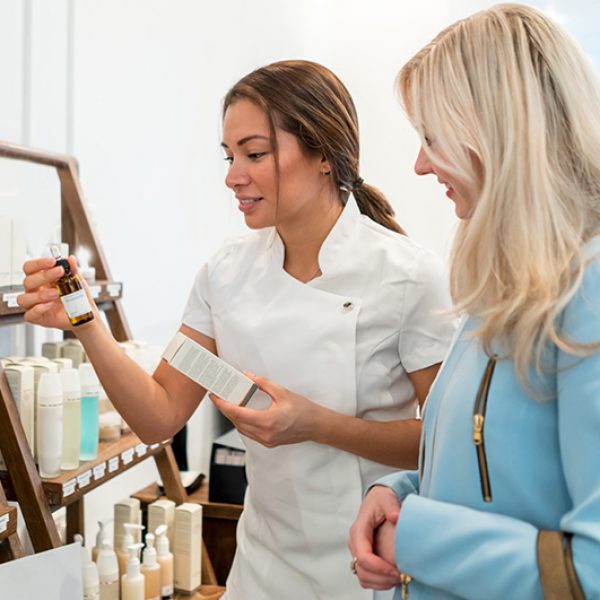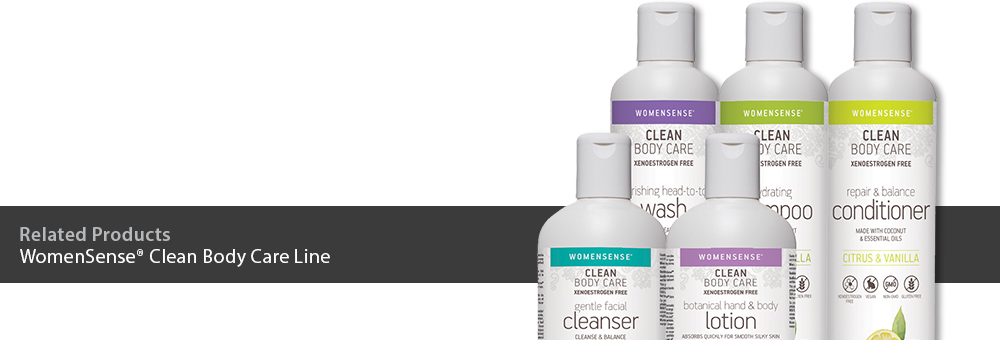

Commercial vs. clean beauty care
You may have noticed a new beauty trend that’s a little different from shades of lipstick or contouring: products claiming to be clean and free from harmful chemicals are showing up on drugstore and Sephora shelves alike, and it seems like everyone’s trying to get in on the action.
So what’s the deal with chemicals found in commercial beauty products? Are they really that bad for us? And, if you do decide to try a clean product, how can be sure you’re getting the best quality?
We’re glad you asked.
Hormone Disruptors in Commercial Beauty Products
According to a study conducted by the Environmental Working Group (EWG), the average woman uses 12 personal care products or cosmetics each and every day, allowing her skin, mouth and lungs to absorb an average of 168 chemicals that may have toxic effects in the body.
Many of these chemicals find their way to the bloodstream, where they wreak havoc with our hormones and internal organs. Most of these chemicals simply overwork the liver as it tries to clean toxins from our system, but some are endocrine disruptors that cause a condition called Estrogen Dominance.
The symptoms of Estrogen Dominance range from mild to severe, but can severely impact health and lifestyle. They include: decreased sex drive, irregular or otherwise abnormal menstrual periods, bloating, breast swelling and tenderness, fibrocystic breasts, headaches (especially premenstrually), and mood swings (most often irritability and depression).
All from the cosmetics we’re using on a daily basis!
The Top Offenders & How to Spot Them
This article isn’t intended to scare or overwhelm you: while the state of the commercial beauty industry looks a little bleak from some angles, there are great companies out there creating products and are clean and safe.
To choose a good product, we recommend checking ingredients and making sure they’re free of these top endocrine disruptors:
Parabens
Parabens have been used as preservative in cosmetics since the 1950s, but more and more research is showing how dangerous they are to absorb or ingest regularly.
Predominantly, parabens have been linked to breast cancer – they’re believed to mimic estrogen in the body and contribute to reproductive kinds of cancer (breast, ovarian, etc.). Malignant breast tumours have even been shown to have trace amounts of parabens in them!
Note: when looking at the ingredients in products, most parabens will be easy to identify: butylparaben, methylparaben, propylparaben, etc. However, they can also be listed as Alkyl parahydroxy benzoates.
Propylene Glycol
In cosmetics, propylene glycol is used in small amounts to keep products from melting in high heat or from freezing. It also helps active ingredients penetrate skin.
Unfortunately, it’s also considered a neurotoxin by the CDC, and is an active ingredient in antifreeze!
Phthalates
Phthalates have traditionally been used as a plasticizer in nail polish, to create flexibility in hair sprays, and as a fixative in fragrances.
They’re also another estrogen-mimicker, and a known carcinogen. Additionally, they’re considered to be reproductive toxicants: they have a heavily negative impact on fertility, especially in adult males (but also in women).
TPHP
Triphenyl phosphate, or TPHP, was developed as an alternative to phthalates in the last decade and has been used in many of the same products. Unfortunately, TPHP is now being shown to also be a toxin that disrupts our endocrine system and is carcinogenic!
So… what now?
In the case of “clean” vs. commercial cosmetics, my number 1 recommendation is to do a little bit of research on the company you’re buying from. If their website mentions the toxins above and explains that they’re free from harmful chemicals, chances are you’re in good hands.
If they simply have a “paraben-free” sticker on their label, you might want to do a little more digging – some companies will still try to cut corners while capitalizing on the “clean” beauty product industry.
You can also check out free resources like the Environmental Working Group, Think Dirty, Cert Clean and their consumer guides, which provide lists of truly clean and safe products and companies.
A little education and research can go a long way towards ensuring that your beauty products are actually beautiful – from the inside out!
You can start with the WomenSense Clean Body Care line of products, dedicated to helping women love their hair and skin, naturally. Each product is carefully formulated to provide salon-quality results, without the xenoestrogens, toxins, and perfumes commonly found in health and beauty aids. WomenSense Clean Body Care products are all natural, vegan friendly, non- GMO, gluten free, and are not tested on animals.
This line of products includes hydrating shampoo and repair & balance conditioner, nourishing body wash, gentle facial cleanser, and botanical lavender hand & body lotion.

